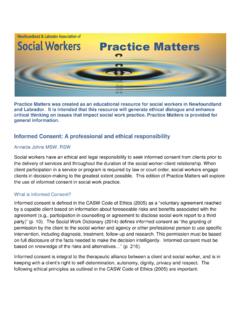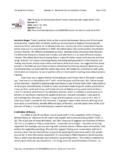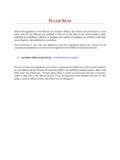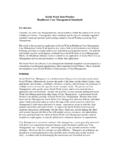Transcription of STANDARDS FOR TECHNOLOGY USE IN SOCIAL …
1 STANDARDS FOR TECHNOLOGY USE. IN SOCIAL work PRACTICE. Adopted February 3, 2012. TABLE OF CONTENTS. Introduction 1. STANDARDS for TECHNOLOGY Use in SOCIAL work Practice 2. Definitions 3. Rationale 4. STANDARDS for TECHNOLOGY Use in SOCIAL work Practice (Elaborated) 4. Conclusion 12. Acknowledgements 12. References 13. INTRODUCTION. The Newfoundland and Labrador Association of SOCIAL Workers (NLASW) is the regulatory body and professional association for SOCIAL work in Newfoundland and Labrador. NLASW is responsible for regulating the practice of SOCIAL work under provincial legislation titled the SOCIAL Workers Act, SNL 2010, The vision is Excellence in SOCIAL work . TECHNOLOGY has become an integral part of SOCIAL work practice. STANDARDS for TECHNOLOGY Use in SOCIAL work Practice have been developed to guide SOCIAL workers as they move forward in this digital age'.
2 This document builds on the 2005 NLASW discussion paper Confidentiality in the Age of TECHNOLOGY . The NLASW believes that it is important to engage members in the development of professional STANDARDS for the SOCIAL work profession in Newfoundland and Labrador. In January 2011, the NLASW invited SOCIAL workers with an interest in SOCIAL work TECHNOLOGY to become part of an ad-hoc committee to inform the development of STANDARDS for TECHNOLOGY Use in SOCIAL work Practice. In March 2011, members were invited to complete a short needs assessment to identify issues related to the use of TECHNOLOGY in SOCIAL work practice, including risks and benefits. A thorough literature review was also completed. In October 2011, members were invited to review and provide feedback on the draft STANDARDS . The NLASW Board of Directors adopted the final document on February 3, 2012.
3 The purpose of these STANDARDS is to: a) Support SOCIAL workers in their use of TECHNOLOGY in SOCIAL work practice, b) Highlight awareness of the practice considerations and ethical responsibilities when using TECHNOLOGY in practice, and c) Inform SOCIAL workers, employers and the public on best practice STANDARDS for SOCIAL work . STANDARDS for TECHNOLOGY Use in SOCIAL work Practice 1. STANDARDS FOR TECHNOLOGY USE IN SOCIAL work PRACTICE. Standard 1: TECHNOLOGY use in SOCIAL work practice is grounded in the values, ethics and principles of the SOCIAL work profession. Standard 2: SOCIAL workers ensure proficiency in the use of TECHNOLOGY in the workplace and practice within their competency, while continuing to enhance their knowledge, skills and abilities. Standard 3: As part of the informed consent process, SOCIAL workers inform clients about technologies that are being used in the delivery of SOCIAL work services, including the inherent risks and opportunities.
4 Standard 4: SOCIAL workers document all electronic communications in keeping with agency/organizational policies, ethical STANDARDS , and best practice guidelines. Standard 5: SOCIAL workers have a responsibility to be aware of inter-jurisdictional issues when providing therapy or SOCIAL work services using electronic technologies ( , on-line counselling, on-line support groups, video conferencing etc). Standard 6: SOCIAL workers who use technological approaches to conduct SOCIAL work research or to gather information/research to inform practice do so in a manner that ensures ethical credibility. Standard 7: SOCIAL workers consider issues relating to conflicts of interest, dual and multiple relationships and boundaries as it pertains to the use of TECHNOLOGY in practice. Standard 8: SOCIAL workers using TECHNOLOGY to advance SOCIAL justice issues, engage in advocacy efforts, and/or participate in political action, adhere to the values and principles of the SOCIAL work profession.
5 STANDARDS for TECHNOLOGY Use in SOCIAL work Practice 2. DEFINITIONS. SOCIAL work According to the International Federation of SOCIAL Workers (2000): The SOCIAL work profession promotes SOCIAL change, problem solving in human relationships and the empowerment and liberation of people to enhance well-being. Utilising theories of human behaviour and SOCIAL systems, SOCIAL work intervenes at the points where people interact with their environments. Principles of human rights and SOCIAL justice are fundamental to SOCIAL work . The SOCIAL Workers Act 2010 of Newfoundland and Labrador defines SOCIAL work as: the assessment, remediation and prevention of psycho- SOCIAL problems and the enhancement of the SOCIAL , psycho- SOCIAL functioning of individuals, families, groups and communities by (i) providing direct counselling and therapy services to clients, (ii) developing, promoting and delivering human service programs, including those done in association with other professions, (iii) contributing to the development and improvement of SOCIAL policy, and (iv) conducting research in the science, technique and practice of SOCIAL work .
6 SOCIAL Worker In order to refer to oneself as a SOCIAL worker or to practice within the scope of practice of the SOCIAL work profession in Newfoundland and Labrador, an individual must meet the criteria for registration as outlined under the SOCIAL Workers Act 2010. Registered SOCIAL workers are granted the RSW designation. Use of the RSW designation affirms that the individual has met the criteria for registration and has been granted use of the title and right to practice SOCIAL work in Newfoundland and Labrador. Clients Clients include a person, family, group of persons, incorporated body, association or community on whose behalf a SOCIAL worker provides or agrees to provide a service or to whom the SOCIAL worker is legally obligated to provide service (CASW, 2005a, p. 10). The word, client, acknowledges the power differential that exists between giver and receiver of service.
7 STANDARDS for TECHNOLOGY Use in SOCIAL work Practice 3. RATIONALE. Increasingly, SOCIAL workers use TECHNOLOGY to provide SOCIAL work interventions, document client service delivery, communicate with clients, colleagues and organizations, send and receive faxes, conduct research on theories, techniques and interventions, and access community resources. On-line counselling (or e-therapy) and SOCIAL media are also being used more frequently in SOCIAL work practice. TECHNOLOGY use will continue to grow and expand in SOCIAL work practice, and with this use comes unique opportunities and challenges. It is therefore necessary that SOCIAL workers have the skills, knowledge and expertise to incorporate TECHNOLOGY into ethical practice. While organizations have policies in place for TECHNOLOGY use, these STANDARDS have been developed to highlight some of the ethical, best practice, and professional issues that need to be considered in SOCIAL work practice.
8 For the purpose of this document TECHNOLOGY refers to any mode of electronic communication used in the delivery of SOCIAL work services (examples include but are not limited to e-mail, text messages, electronic records, SOCIAL media, e-therapy, on-line support groups, and telehealth). STANDARDS FOR TECHNOLOGY USE IN SOCIAL work PRACTICE (ELABORATED). These STANDARDS are informed by the Canadian Association of SOCIAL Workers (CASW) Code of Ethics (2005), the CASW Guidelines for Ethical Practice (2005), the National Association of SOCIAL Workers (NASW) and the Association of SOCIAL work Boards (ASWB) STANDARDS for TECHNOLOGY and SOCIAL work Practice (2005), the New Brunswick Association of SOCIAL Workers (NBASW). STANDARDS for the Use of TECHNOLOGY in SOCIAL work Practice (2010), and relevant SOCIAL work and professional literature. Standard 1: TECHNOLOGY use in SOCIAL work practice is grounded in the values, ethics and principles of the SOCIAL work profession.
9 The CASW Code of Ethics (2005) outlines the values and principles that guide professional SOCIAL work practice. These values include: 1) Respect for the Inherent Dignity and Worth of Persons 2) Pursuit of SOCIAL Justice 3) Service to Humanity 4) Integrity in Professional Practice STANDARDS for TECHNOLOGY Use in SOCIAL work Practice 4. 5) Confidentiality in Professional Practice 6) Competence in Professional Practice TECHNOLOGY use in SOCIAL work practice will continue to evolve. Therefore, it is important that SOCIAL workers continue to explore how TECHNOLOGY impacts on their professional practice including clinical, administrative, community practice, SOCIAL policy and education. Some of the professional practice issues that SOCIAL workers will need to address include privacy and confidentiality, informed consent, and dual and multiple relationships.
10 A reflection on each of the values outlined in the CASW Code of Ethics (2005) is important in resolving ethical conflicts that relate to TECHNOLOGY in SOCIAL work practice. Standard 2: SOCIAL workers ensure proficiency in the use of TECHNOLOGY in the workplace and practice within their competency, while continuing to enhance their knowledge, skills and abilities. According to the NASW/ASWB STANDARDS for TECHNOLOGY and SOCIAL work Practice (2005), SOCIAL workers need to become proficient in the technological skills and tools required for competent and ethical practice and for seeking appropriate training and consultation to stay current with emerging technologies (p. 7). These skills are necessary in all areas of SOCIAL work practice. Generally, organizations and employers have established policies and may provide training and education to guide SOCIAL workers' use of technologies in practice that are required by the organization ( , electronic documentation, video-conferencing, use of wireless technologies, etc).









